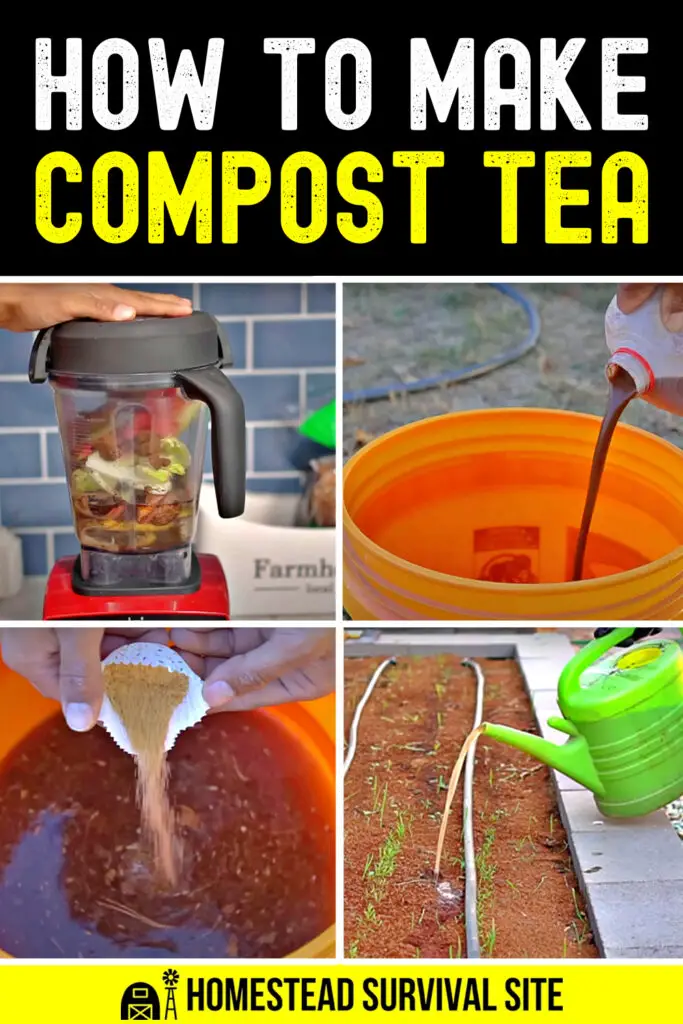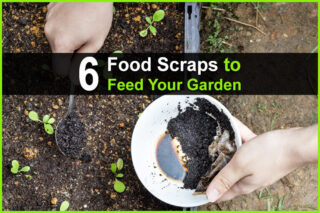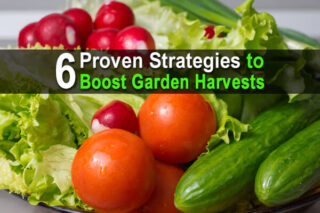Estimated reading time: 6 minutes
One of the best ways to keep your plants healthy and thriving is to use compost tea. This is a tea made from compost that is brewed and then used as a foliar spray or soil drench.
Not only does it help to improve the health of your plants, but it can also help to increase yields.
In this blog post, we will show you how to make compost tea using simple ingredients that you likely already have on hand. So let's get started!
Want to save this post for later? Click Here to Pin It On Pinterest!
What is Compost Tea?
Compost tea is a nutrient-rich solution created by steeping organic matter, such as compost or manure, in water. This mixture can be applied to soil to boost the growth of plants and ensure that they have access to important nutrients and minerals.
Unlike traditional fertilizers, which only provide a few key compounds, compost tea provides plants with a wide range of beneficial compounds.
In addition, compost tea helps to improve soil structure, increasing its ability to retain water and fight off pests and diseases. Overall, compost tea is a versatile and valuable tool for gardeners looking to enhance their plants' growth and health.
Why Should You Make Compost Tea?
There are many reasons why you should consider making compost tea for your garden. For starters, compost tea is full of beneficial nutrients that can help to nourish and enrich your plants.
The active microbes present in the tea also help to break down organic matter in the soil, improving soil structure and promoting healthy root growth. Compost tea is made by steeping processed organic waste such as recycled food scraps in water. The liquid that results is rich in beneficial microbes and nutrients that can help to promote healthy growth in your garden plants.
Additionally, compost tea can help to regulate soil pH, reducing acidity or alkalinity and protecting plant roots from toxic elements. By incorporating compost tea into your garden care routine, you can give your plants the nutrients they need to thrive, no matter what type of soil or weather conditions they might face.
Unlike conventional fertilizers, compost tea does not require intensive chemical processing and typically contains fewer harmful by products.
So if you want to keep your garden looking its best, don't hesitate to start brewing some compost tea today!
How to Make Compost Tea
To make compost tea, the first step is to make and collect some compostl.
There are many different methods for making compost, but the basic steps are generally the same. The first step is to collect materials such as dried leaves, grass clippings, fruit cores, coffee grounds and other kitchen scraps.
Once you have a good source of organic matter, you will need to start the decomposition process by adding moisture and oxygen. This can be done easily by turning your compost pile every few days with a shovel or garden fork. Over time, the organic matter will begin to break down into nutrient-rich humus that you can use in your garden or flower beds to help your plants thrive.
The next step is to fill a bucket or other container with your compost material and then add water to it. Stir the mixture well so that all of the ingredients are evenly mixed together.
The next step is to allow the ingredients to steep in the water for several days, stirring periodically to make sure everything remains evenly mixed. During this time, nutrients from the compost will leach out into the water, creating a nutrient-rich compost tea that can be used as a natural fertilizer for your garden or plants.
When you're ready to use your finished compost tea, strain it using a fine-mesh sieve or cheesecloth and apply it directly to your plants using a watering can or spray bottle.
How to Use Your Compost Tea
To give your plants the nourishment they need to thrive, it's important to apply compost tea regularly. Compost tea is a liquid fertilizer created by soaking compost in water and then aerating it to allow beneficial microorganisms to develop.
Applying this rich brew directly to your plants can help boost their growth and resilience, especially during periods of stress or drought. You can pour it directly onto the roots of your plants or mix it into the potting soil.
When applying compost tea, it's important to take into account the specific needs of your plants. Depending on what you're growing, you may want to use a stronger or weaker brew as needed.
You can also adjust the frequency of application according to the size and condition of your plants. Generally speaking, larger and more established plants will need less frequent applications than smaller or more delicate ones. And always be sure to lightly mist your leaves with the tea for best results.
What is the Best Time of Year to Make Compost Tea?
Some people might argue that it is best to make compost tea during the winter, when most plants are dormant and have less work to do processing nutrients from the soil.
Others might suggest spring or summer as ideal times for compost tea, when plants are growing and reproducing quickly and have a high demand for nutrients.
Ultimately, the best time of year to make compost tea comes down to personal preference. It’s hard to overdo it on compost tea – so don’t be afraid to make it several times per year and use it exactly when your plants need it most.
Tips for Using Compost Tea in the Garden
There are some important tips that you should keep in mind when using compost tea in your garden.
First, be sure to use only high-quality compost that has been properly processed and aged – fresh or “hot” compost may contain harmful pathogens that can damage your plants.
Next, make sure to use only clean water that has not come into contact with any pesticides or other chemicals – this will ensure that the nutrients in the tea are not tainted or diluted.
Always apply the tea right after mixing, while it is still fresh and strong. Avoid storing the mixture for long periods of time as this may impede its beneficial effects on plant health.
And finally, be sure to apply the tea at regular intervals during times of growth for best results – early morning or evening are ideal times for watering your garden so as not to disrupt the heat of the day or deprive your plants of necessary moisture.
Wrap-Up
So, if you’re looking to make your own compost tea, give these tips a try. And don’t forget to share your photos and experiences with us in the comments below!
Like this post? Don't Forget to Pin It On Pinterest!
You May Also Like:












